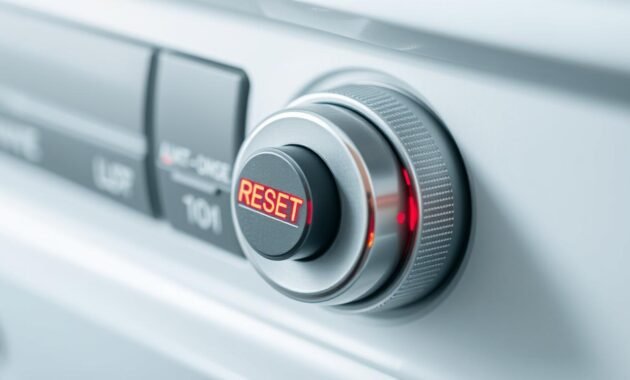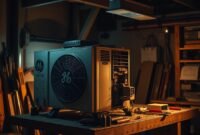Are you tired of your air conditioner reset button always tripping? It can make your home feel like an oven on hot days. This issue not only makes your home uncomfortable but could also harm your expensive HVAC system.
As someone who’s been there, a reset button that keeps tripping is more than just a hassle. It’s a sign of a bigger problem. It could be electrical issues, mechanical failures, or just neglect. Knowing why it happens is key to avoiding expensive fixes and keeping your home cool.
In this guide, we’ll explore why your air conditioner’s reset button keeps tripping. We’ll go over how to diagnose and fix the problem. You’ll learn simple fixes and when to call a pro. We aim to help you keep your cooling system in top shape.
Read also: How to Reset HiSense Air Conditioner

Understanding Your AC Circuit Breaker System
Your home’s air conditioning system has a key safety part: the circuit breaker. It keeps your AC safe from electrical problems. Knowing how it works helps you spot and fix issues with your AC.
How Circuit Breakers Protect Your AC Unit
Circuit breakers are vital for your electrical safety. They stop power when there’s too much current. This protects your AC’s outside unit from damage or fire.
- Prevents electrical overloads
- Stops possible fire risks
- Keeps expensive AC parts safe
Locating Your AC Circuit Breaker Panel
It’s smart to know where your circuit breaker panel is. You’ll usually find it in:
- Garage
- Basement
- Utility closet
- Outside your house
Signs of Normal vs Problematic Tripping
Not all breaker trips are bad. Sometimes, it’s okay if it trips during busy times. But if it trips a lot, it might mean a bigger problem. Watch how often it trips to see if you need a pro.
Read also: AC Trips Breaker After 5 Minutes?
If you’re unsure, get a professional electrician. They can check your AC and electrical connections.
Why Your Air Conditioner Reset Button Keeps Tripping

When your air conditioner’s reset button keeps tripping, it’s not just a minor issue. It’s a sign of bigger problems that need your attention. The reset button is a safety feature that protects your electrical system from dangerous malfunctions.
There are several reasons why your reset button might keep tripping:
- Electrical overload in the air conditioning system
- Dirty or clogged air filters restricting airflow
- Refrigerant level imbalances
- Compressor or motor complications
- Wiring problems within the electrical circuit
Many homeowners face the problem of reset button tripping. It usually comes from hidden issues. Things like electrical surges, weather stress, or old parts can cause it. Your AC’s reset button is actually stopping electrical hazards.
It’s important to find out why it’s happening. Some problems are easy to fix yourself. But others need a pro. We’ll look into specific electrical and mechanical issues that might be causing the problem.
Common Electrical Issues Leading to Breaker Trips
Electrical problems can really mess with your air conditioning system. They might cause breaker trips, making your home less comfortable. Knowing about these issues can help figure out why your air conditioner reset button keeps tripping.
When electrical systems go wrong, your AC unit is at risk of shutting down unexpectedly. Let’s look at the main electrical problems that can lead to circuit breaker issues.
Loose Wire Connections Create Electrical Hazards
Loose electrical connections are a big risk for breaker trips. Temperature changes and wear can loosen wires, causing more electrical resistance and overheating.
- Check visible wire connections for signs of wear
- Look for discoloration around electrical terminals
- Listen for buzzing or crackling sounds near electrical panels
Faulty Circuit Breaker Complications
Circuit breakers can wear out over time, becoming less effective. A damaged breaker might trip for no reason or not trip when it should.
Short Circuit Risks
Short circuits are the biggest danger to your air conditioner reset mechanism. When electrical current finds the wrong path, it can cause quick and severe breaker tripping.
- Damaged wire insulation
- Exposed electrical components
- Internal AC unit wiring failures
Professional electricians can find these complex electrical problems. They make sure your AC system works safely and well.
The Impact of Dirty Air Filters on Circuit Performance

Dirty air filters can quietly harm your air conditioning system. When they get clogged, they start a chain of problems. This can lead to your circuit breaker tripping.
Many homeowners don’t know how simple maintenance can avoid big electrical issues. A clogged air filter makes your air conditioning system work too hard. The exterior unit has trouble pulling air, causing the fan motor to use more electricity.
- Airflow restriction increases electrical consumption
- Excess strain on fan motors
- Potential damage to air conditioning components
Regular filter checks are key to avoiding these problems. I suggest checking your air filters every 30-90 days. Homes with pets, lots of dust, or outdoor activities need more frequent changes.
Here are signs your filter needs to be replaced:
- Visible dust and debris buildup
- Reduced airflow from vents
- Increased energy bills
- Frequent circuit breaker trips
Being proactive with air conditioning filter maintenance helps a lot. It prevents electrical stress and makes your HVAC system last longer. A clean filter also keeps your circuit breaker safe and improves air quality.
Compressor-Related Problems Causing Breaker Trips
The compressor is the heart of your air conditioning system. When it has problems, your air conditioner reset button may get more sensitive. As compressors get older, they can face issues that strain the AC’s electrical system and cause breaker trips.
Knowing about compressor problems can help you spot AC system failures early. This can save you from expensive repairs. Let’s look at the common compressor issues that might cause system malfunctions.
Read also: Common Causes for Air Conditioner Fans Not Spinning
Hard Starting Issues
A hard start happens when your compressor has trouble starting. This forces the system to use too much electrical current, which can trip the circuit breaker. A hard start kit can help by giving an extra electrical boost when starting.
- Increased electrical resistance during startup
- Prolonged motor engagement time
- Potential premature compressor failure
Grounded Compressor Symptoms
A grounded compressor means the motor’s electrical windings are damaged. When these windings touch the compressor’s metal frame, it creates a direct electrical path. This can cause the breaker to trip right away.
- Burning electrical smell
- Immediate circuit breaker tripping
- Complete system shutdown
Worn Out Compressor Signs
Old compressors lose efficiency and have more electrical issues. Spotting these signs early can help fix problems before they get worse.
| Symptom | Potential Indication |
|---|---|
| Unusual clicking sounds | Mechanical wear and bearing damage |
| Reduced cooling performance | Decreased compressor efficiency |
| Frequent cycling | Motor struggling to maintain operation |
If you’re having ongoing compressor problems, get an HVAC expert to check it out. They can tell if you need a repair or a new compressor for your air conditioning system.
External Unit Issues and Maintenance
Your air conditioning system’s exterior unit is key to keeping your home cool. It works hard to move heat away from your home. But, dirt and debris can easily harm it.
When the exterior unit gets dirty, it stops heat from moving properly. This makes your AC work too hard. It’s like wearing a thick blanket that stops heat from escaping.
Dirt and grime can really hurt your air conditioning system’s performance. Many homeowners struggle with cooling because they ignore their exterior unit. The fins and coils get dusty, blocking heat from escaping.
- Clear a 2-foot area around the exterior unit
- Remove leaves, grass clippings, and branches
- Gently clean fins with a soft brush
- Check for any visible damage or obstruction
Regular maintenance is key to avoiding problems. I suggest checking the exterior unit twice a year. Once before summer and once before winter. Keeping it clean ensures good airflow and prevents breakers from tripping.
If you see a lot of buildup or damage, call a pro. Some tasks need special tools and knowledge to avoid harming your system.
Warning Signs of Serious Electrical Problems
Electrical problems in your air conditioning system can turn from small issues to big dangers fast. Spotting early warning signs can stop expensive fixes and keep your home safe. If your reset button keeps tripping, look out for serious electrical issues.
Burning Smells and Unusual Noises
Your nose and ears can help spot electrical problems. A burning smell near your AC unit means trouble. It could mean:
- Overheating electrical parts
- Melting wire insulation
- Potential electrical short circuits
Strange noises like buzzing, crackling, or humming can also warn of electrical issues. These sounds often mean loose connections or failing parts.
Visual Indicators of Electrical Issues
Looking closely can show important electrical warning signs. Watch for these:
| Warning Sign | Potential Electrical Problem |
|---|---|
| Scorch marks around outlets | Potential wire arcing or short circuit |
| Discolored electrical panel | Overheating or dangerous electrical load |
| Visible wire damage | Risk of electrical failure |
If you see any of these signs, turn off your AC and call a pro electrician right away. Your safety is the most important thing when dealing with electrical issues.
Prevention Tips and Regular Maintenance Guidelines
To keep your air conditioning system in great shape, you need to take care of it regularly. This care can stop sudden breakdowns and make your air conditioner last longer. By taking a smart maintenance approach, you’ll save money and keep your system running well when it’s hottest.
Preventive maintenance is key for your air conditioning system. I suggest a detailed plan that includes DIY tasks and professional checks.
Seasonal Maintenance Checklist for Homeowners
- Replace air filters every 1-3 months
- Clean outdoor unit and remove debris
- Check refrigerant levels
- Inspect electrical connections
- Clean air conditioning vents and registers
Professional Inspection Schedule
| Season | Recommended Inspection | Key Focus Areas |
|---|---|---|
| Spring | Pre-cooling season check | System efficiency, refrigerant levels |
| Fall | Post-cooling season evaluation | Electrical components, wear and tear |
Professional air conditioner maintenance usually costs between $75-$200 per visit. This is a smart investment to avoid expensive repairs and boost your system’s efficiency. Regular inspections can spot problems early, before they get big.
By following these maintenance tips, your air conditioning system will work smoothly, efficiently, and with less chance of sudden failures.
Conclusion
I’ve shown you the reasons why your air conditioner reset button keeps tripping. Knowing why can save you time, money, and stress during hot summers. We’ve looked at electrical issues and maintenance problems that might cause your AC to shut down.
It’s important to notice warning signs early. If your air conditioner reset button keeps tripping, it means something’s wrong. Simple steps like checking air filters and ensuring electrical connections are correct can help. Also, regular professional inspections can prevent big problems.
Some AC issues you can fix yourself, but complex electrical problems need a pro. I suggest getting help from certified HVAC technicians for these problems. Keeping your AC well-maintained is key to a safe, cool home.
Remember, a well-kept air conditioning system is more than just comfort. It’s about keeping your family safe and cool. Stay alert, listen to your AC, and get help when you need it.


